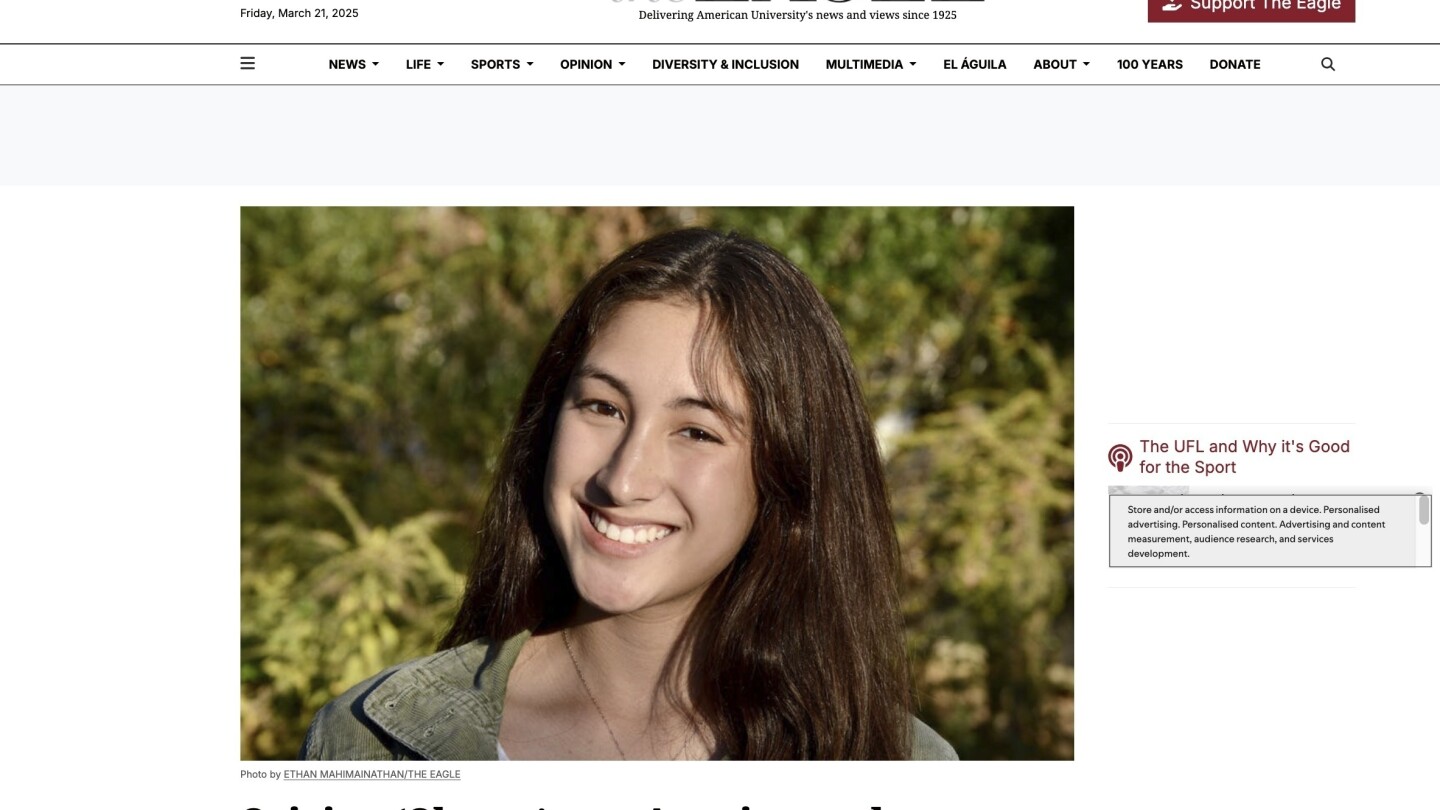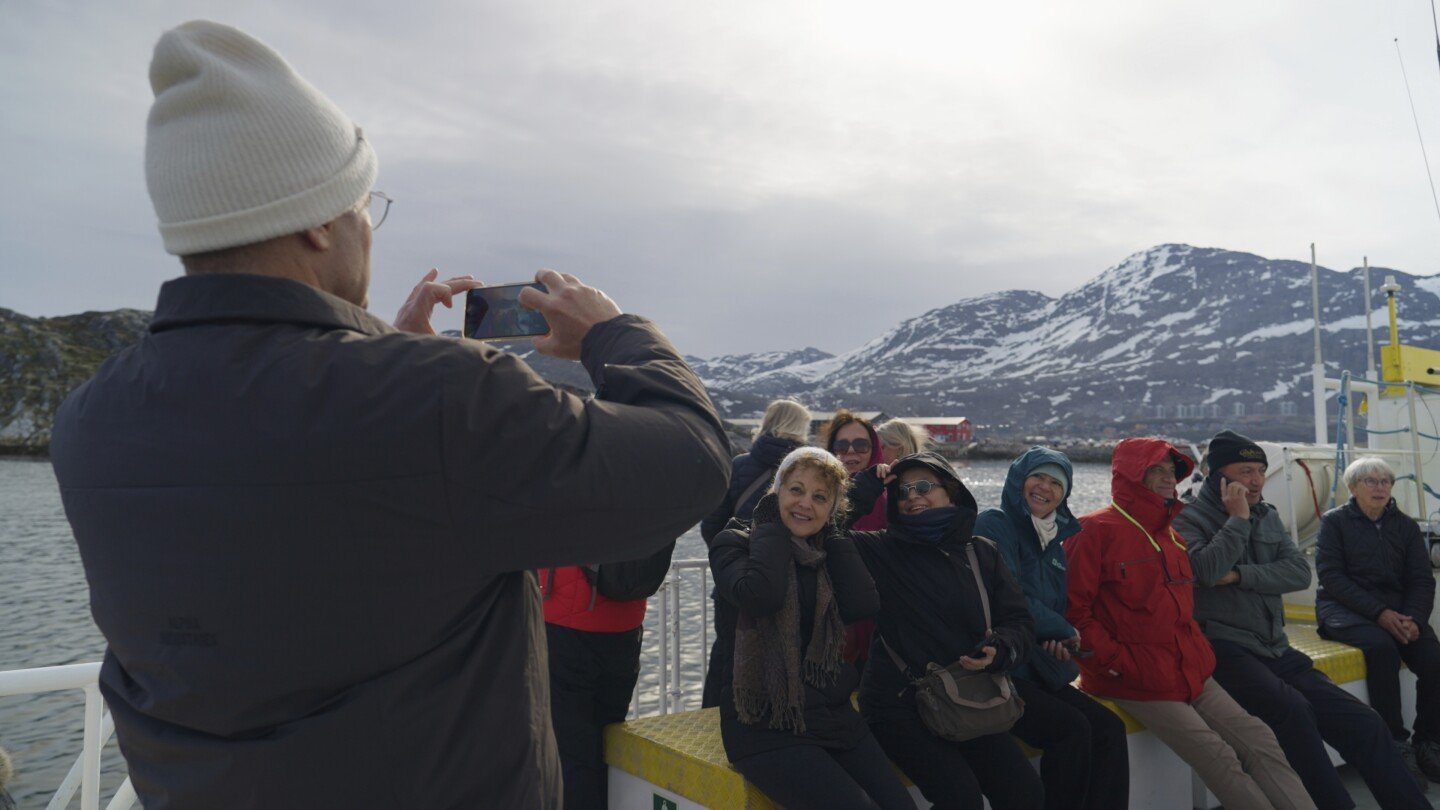Lifestyle
You’re an American in another land? Prepare to talk about the why and how of Trump 2.0

LONDON (AP) — The urgent care doctor cocked an eyebrow at Mari Santos and her American accent.
It was four days after President Donald Trump’s inauguration, and Santos was a student with a stomach bug in the first weeks of an overseas semester in Glasgow, Scotland. A doctor arrived to see her after a six-hour wait. But before asking what ailed her, he said this: “Interesting time to be an American, I suppose.”
Until then, Santos, 20, had not been thinking about Trump — just her 104-degree fever and concern about being sick while abroad. But the president and his triumphant return to the White House, she says, were on her physician’s mind, giving the American University student an instant education in geopolitics. The lesson, as she sees it: “There’s a kind of chilling in the air.”
“I knew that maybe that Europe is not in general big fan of American politics,” Santos said, “but I didn’t expect it to be such like a personal thing.”
The United States and its center of gravity occupy a unique space in the international conversation. People the world over talk about America — its policies, its proclivities, its place in the world. They have for generations. They did it during the Iraq War. They did it during the first Trump administration.
And two months into Trump 2.0, at least in many European and English-speaking countries, it’s happening again — sometimes even more intensely.
People from other countries have questions about Trump — and trust
Answering for America under the new Trump administration is becoming a delicate experience for some of the estimated 5 million U.S. citizens living in other countries.
From Santos in Scotland to others in New Zealand, France, Germany, the United Kingdom and Canada, Republican and Democratic expats alike told The Associated Press in recent weeks that the moment they are revealed to be American changes virtually every conversation to, in essence, “What about Trump?”
At its root, this change is about whom to trust among those thought until now to be allies, in world politics and in life. Trump, known for insisting the truth is what he says it is, is now the voice of America — not VOA, the independent news service that told the nation’s story for eight decades until he silenced it March 16. The president himself has set an example in which trust is almost beside the point.
“Who do I trust? I mean, who do you trust? Do you trust anybody?” he said during an interview last month with The Spectator, when asked how much he trusts people like Jeff Bezos, owner of The Washington Post.
What comes after the revelation that someone is American, U.S. citizens overseas say, are awkward questions, pauses and euphemisms — but almost always a reference to America under Trump in 2025.
“Before this year, the typical follow-up would be asking where exactly I’m from and what brought me to France,” said Anthony Mucia, 31, a Nebraska native who lives in Toulouse, France and has been overseas for six years. “Twice now, the first thing someone asked me was, ‘Are you glad to be in France now?’” He also gets looks that he interprets as “a bit of ‘shock’ or ‘uneasiness.’ Almost like it automatically turned into an embarrassing topic.”
What’s bending these interactions, expats say, is Trump’s flurry of orders and statements that have upended 80 years of international order and spooked markets.
He’s talked about how the U.S. will “one way or the other” capture Greenland from Denmark, “take back” Panama and make Canada the 51st U.S. state. He wants to empty and develop war-battered Gaza, and has cut off U.S. aid to the world’s neediest people. He’s falsely blamed President Volodymyr Zelenskyy for starting the Russian invasion and ended a White House meeting with Zelenskyy after berating the Ukrainian leader. Trump has let Europe’s leaders know that the U.S. is not a staunch ally in facing the Russian threat. And he’s set off tariff wars with China, Canada and Mexico.
Not smoothing the American experience overseas is the backlash developing against Trump’s association with Elon Musk and Tesla, which has fueled growing boycott movements. People are joining Facebook groups to exchange ideas about how to avoid U.S. products. Feelings are especially strong across the Nordic region — particularly Denmark, where Trump’s moves have set “the Danish Viking blood boiling,” one man told The Associated Press.
So far, the interactions are less hostile than wary, Americans overseas say. But anti-U.S. sentiment is emerging as a concern on the cusp of what’s expected to be a record-setting international travel season for Americans.
Prepare to talk about ‘what’s going on’
Jake Lamb, 32, moved from Colorado to Auckland, New Zealand in 2023. He said says he’s “noticed a significant shift in the types and frequency of questions I’m asked” over the past year. Kiwis remain friendly about it, but they’ve been saying they might have to “hide” Lamb or vouch that he’s “one of the good ones” if Trump escalates conflicts with former allies. He thinks that the good humor belies wariness.
“I am concerned that it may become difficult for some not to hold individual Americans responsible,” Lamb, a volunteer coordinator for a charity and who voted for Democrat Kamala Harris, said in an email.
Elizabeth Van Horne, 33, has lived in France since 2013. For years, she said, people would ask “why on Earth I’d come to live in France if I could live in the U.S: ‘It’s so beautiful, there’s so much potential, so much opportunity, like living in a TV show.’”
“Now, that romanticized image has completely changed,” Van Horne, a Democrat, said in an email. Early in March, a postal worker told her it’s sad to watch.
“For me,” she said, “that conversation summed it up: ‘Je suis desole pour vous’ — ‘I’m sorry for you.’”
For Trump supporters abroad, it can be complicated
Georganne Burke, a Syracuse, N.Y., native living in Ottawa, supported Trump in all three elections and is the chairwoman of Republicans Overseas in Canada. She’s a dual citizen, which makes her something like the Peace Bridge that links the two nations in Buffalo, N.Y.
Trump’s tariff war, his manner and his provocative talk about how Canada “only works” as the 51st U.S. state “has everybody’s hair on fire,” she said in an interview. Burke, 77, says she’s received threats and had a tense talk with an anti-Trump co-worker. People ask her, “How could anyone vote for him?”
An invitation to speak about trade near the end of March, she says, came with the organizer saying that he was “pretty sure that most of the people will be polite.” Burke accepted the invitation.
She says anti-American sentiment was bad during the Iraq war under President George W. Bush in 2003. But now it’s different.
“Then, it was kind of more on the politicians,” as the targets of public ire, Burke said in a recent interview. “Now, it’s much more personal.”
Burke’s counterpart in London, Greg Swenson of Republicans Overseas UK, says walking around as an American in another country remains more positive than negative. In interviews with media outlets, he readily acknowledges Trump can be “obnoxious.” But Swenson, 62, is an investment banker, and he says the president and America remain good for business.
Greg Swenson of Republicans Overseas UK, poses for a photograph in London, Thursday, March 20, 2025. (AP Photo/Kin Cheung)
“In the private capital world, which is not affected by day-to-day (market) volatility, there is just a huge amount of optimism,” Swenson said. That means, he says, that investors want to work with U.S. vendors and customers, seeking American “credibility” through “an affiliation with the president.”
As for what people overseas think of Americans right now: A survey of social media, neighbors and others shows plenty are curious and concerned. When an American dad posted on Reddit his worry that his family won’t be welcomed in Ireland, an Irish dad who asked the AP to identify him by his Reddit handle responded this way:
“A lot of people like me are really, really alienated and angry at the US and Americans,” wrote MDMB13. “But the good news is we’re Irish so you’ll never know because (we) bury our feelings in a far-off place and let them fester over decades.” He ended his comment with a smile emoji.
Lifestyle
Best movies of 2025 (so far) and how to watch them

Often the best movies of the second half of the year come almost preordained as the Oscars Industrial Complex revs into high gear. The first half, though, can offer more of a thrill of discovery.
The first six months of 2025 have offered plenty of that, including indie gems, comedy breakouts and sensational filmmaking debuts. Here are our 10 favorites from the year’s first half.
The Ballad of Wallis Island
“The Ballad of Wallis Island” is the kind of charming gem that’s easy to recommend to any kind of movie lover. It is goofy and friendly, has an armful of lovely folk songs, an all-timer of a rambling character, in Tim Key’s eccentric and completely lovable Charles, Tom Basden’s grumpy, too-cool straight man, and the always delightful Carey Mulligan. “Wallis Island” is a film about letting go and moving on told with humor, wit and a big heart. Also hailing from the British Isles is the equally delightful “Wallace & Gromit: Vengeance Most Fowl.” (streaming on Peacock) —Bahr
One of Them Days
The big-screen comedy has been an almost extinct creature in recent years, but Lawrence Lamont’s “One of Them Days” gives me hope. Not only was this buddy comedy a surprise box-office hit, it is probably the exhibit A in the case of Keke Palmer Should Be in Everything. She and SZA, in her film debut, play Los Angeles housemates in a madcap race to make rent. (Streaming on Netflix) —Coyle
Sorry, Baby
There’s a sequence in Eva Victor’s delicate, considered and disarmingly funny directorial debut, “Sorry, Baby” that kind of took my breath away. You know something bad is going to happen to Agnes, it’s literally the logline of the film. You sense that her charismatic thesis adviser is a bit too fixated on her. The incident itself isn’t seen, Victor places their camera outside of his home. Agnes goes inside, the day turns to evening and the evening turns to night, and Agnes comes out, changed. But we stay with her as she finds her way to her car, to her home and, most importantly to her friend, Lydie (Naomi Ackie). This is a film about what happens after the bad thing. And it’s a stunner. (In theaters) —Bahr
Black Bag
Arguably the best director-screenwriter tandem this decade has been Steven Soderbergh and David Koepp. They were behind the pandemic thriller “Kimi” and another standout of 2025, the ghost-POV “Presence.” But their spy thriller-marital drama “Black Bag,” starring Michael Fassbender and Cate Blanchett as married British intelligence agents, may be their best collaboration yet. It’s certainly the one with the most delicious dialogue. How has it taken the movies this long to make a dinner scene with spies dosed with truth serum? (Streaming on Peacock) —Coyle
Materialists
Dakota Johnson, left, and Pedro Pascal in a scene from “Materialists.” (A24 via AP)
Celine Song’s “Materialists ” might not be the film people wanted it to be, but it’s the film they need in this land of high-end dating apps, designer dupes and everyone pretending to live like minor socialites on Instagram. A thoughtful meditation on money, worth, love and companionship, this is a film that upends everything we’ve come to think we want from the so-called romantic comedy (the idea of prince charming, the inexplicable wealth that’s supposed to coexist with middle class mores). Lifestyle porn will always have a place in the rom-com machine, but this is a populist film, both modern and timeless, that reminds us that love should be easy. It should feel like coming home. “Materialists” is simply the most purely romantic film of the year. (In theaters) — Bahr
Sinners
Michael B. Jordan (twice) and Omar Benson Miller in a scene from “Sinners.” (Warner Bros. Pictures via AP)
Not only does the wait go on for Ryan Coogler to make a bad movie, he seems to be still realizing his considerable talents. There are six months to go, still, in 2025, but I doubt we’ll have a big scale movie that so thrillingly doubles (see what I did there) as a personal expression for its filmmaker as “Sinners.” This exhilarating vampire saga is ambitiously packed with deep questions about community, Black entertainment, Christianity and, of course, Irish dancing. (Streaming on Max) —Coyle
Pavements
In a world of woefully straightforward documentaries and biopics about musicians, Alex Ross Perry decided to creatively, and a little chaotically, upend the form with his impossible-to-categorize film about the 90s indie band Pavement. Blending fact, fiction, archive, performance, this winkingly rebellious piece is wholly original and captivating, and, not unlike Todd Haynes’s “I’m Not There,” the kind of movie to turn someone who’s maybe enjoyed a few Pavement and Stephen Malkmus songs into a fan. (In theaters, streaming on MUBI July 11) —Bahr
April
A rare and exquisite precision guides Dea Kulumbegashvili’s rigorous and despairing second feature. Beneath stormy spring skies in the European country of Georgia, a leading local obstetrician (Ia Sukhitashvili) pitilessly works to help women who are otherwise disregarded, vilified or worse. This is a movie coursing with dread, but its expression of a deep-down pain is piercing and unforgettable. (Not currently available) —Coyle
On Becoming a Guinea Fowl
A visually, and thematically arresting marvel, Rungano Nyoni’s darkly comedic, stylish and hauntingly bizarre film about unspoken generational trauma takes audiences to a place, I’m guessing, many have never been: A Zambian family funeral. And yet its truths ring universal, as the elder generation turns their heads from the awful truth that the dead man, Fred, was a predator and pedophile, while the younger wonders if things must stay as they are. (Streaming on HBO Max on July 4) –Bahr
Friendship
Tim Robinson, left, and Paul Rudd in a scene from “Friendship.” (A24 via AP)
On TV, Tim Robinson and Nathan Fielder have been doing genius-level comedy. Fielder hasn’t yet jumped into his own films, but, then again, it’s hard to get an epic of cringe comedy and aviation safety like season two of “The Rehearsal” into a feature-length movie. But in “Friendship,” writer and director Andrew DeYoung brings Robinson, star of “I Think You Should Leave,” into well-tailored, very funny and dementedly perceptive movie scenario. He plays a man who awkwardly befriends a cool neighbor (Paul Rudd). While their differences make for most of the comedy in the movie, “Friendship” — which culminates in a telling wink — is really about their similarities. (Available for digital rental) — Coyle
Lifestyle
Fears of widening UK trans exclusion sparked by soccer ban

LONDON (AP) — It was not her best goal or most important soccer match, but when the ball hit the back of the net in Natalie Washington’s debut on a women’s team in 2017, she felt a sense of belonging that had been missing.
It was long in coming: Washington had struggled to fit in on a men’s team and eventually stopped playing when she decided to transition to being a woman and go through gender-affirming surgery. When she joined a women’s team, she quickly felt accepted.
Now, after the United Kingdom’s highest court in April said that for anti-discrimination purposes the terms “woman” and “man” refer to biological sex, Washington’s opportunity to play the sport she loves in the league she wants is in doubt.
The head of the U.K’s Equality and Human Rights Commission followed the ruling a day later by saying the court had provided clarity and that transgender women would be excluded from women-only spaces such as toilets, single-sex hospital wards and sports teams.
The Football Association, the regulatory body for soccer in the U.K., followed up by banning transgender players from women’s teams in England and Scotland, a ban that took effect at the start of June.
“It feels like things are being taken away from trans people on an almost daily basis,” Washington said. “It’s another blow, another kick at a time when people are already hurting.”
Long a divisive issue
Beyond Britain, inclusion of trans players in sports has long been a divisive issue, with arguments primarily focused on whether it’s fair to have athletes born as boys compete against girls and women. In the U.S., it has been particularly politicized, with most Republican-controlled states banning transgender athletes in girls’ sports and President Donald Trump signing an executive order to prohibit participation of transgender athletes from girls’ and women’s sports.
The U.K. court said trans people were still protected from discrimination under British law, such as in employment, housing and education, but the ruling means access to certain single-sex facilities could be curtailed.
Trans rights groups condemned the decision, which is likely to have a profound effect for thousands. Out of some 66 million people in England, Scotland and Wales, about 116,000 identified as trans in the latest census count.
The feminist groups who led the legal challenge cheered the ruling and others, including Prime Minister Keir Starmer, welcomed the clarity it brought.
“Everyone knows what sex is and you can’t change it,” said Susan Smith, co-director of For Women Scotland, which brought the case.
A difficult decision
Washington, who leads the group Football v Transphobia, was one of 28 transgender women registered with the Football Association to play amateur soccer. In order to play the women’s game, they had to have testosterone levels reduced to the range of biologically born females.
After the ruling, the organization changed its rules, saying that although it had aimed to make soccer accessible to as many people as possible, it was always prepared to alter its policy if there were changes in the law or science.
“We understand that this will be difficult for people who simply want to play the game they love in the gender by which they identify,” the FA said, adding that it would contact transgender women currently playing to explain the changes and how they can remain involved.
Some clubs have responded by finding ways around the ban. Goal Diggers FC, a women and nonbinary inclusive soccer club based in London, has withdrawn from all FA-affiliated leagues.
On June 1, the day the ban took effect, Goal Diggers hosted an inclusive women’s tournament in London, drawing more than 100 players in a show of solidarity.
“I’ll always have a place here and I’ll always be a trans woman,” said Billie Sky, a 28-year-old trans player for Goal Diggers. “No one can take that away from me.”
Other voices, other sports
Groups that have campaigned to keep trans athletes from girls’ and women’s teams, citing a matter of safety and fairness, welcomed the move by the FA.
“The FA had ample evidence of the harms to women and girls caused by its nonsensical policy of letting men who identify as women play in women’s teams,” said Fiona McAnena of Sex Matters.
Groups that oversee cricket and netball, an offshoot of basketball that is played mainly by women, also limited women’s competition to those who were assigned at birth as females.
The England and Wales Cricket Board said transgender women and girls could continue playing in open and mixed cricket. England Netball said it would allow anyone to play in a new mixed category beginning in September.
How the ruling came about
The legal case involved a 2018 Scottish law requiring at least half of the seats on public boards to be held by women. Trans women with certificates recognizing their gender were to be included in meeting the quota.
The court said that using the certificates to identify someone’s gender clashes with the definitions of man and woman. Under the ruling, a transgender person could not claim they had been discriminated against if barred from a single-sex space.
Alexander Maine, a senior lecturer at The City Law School specializing in gender, sexuality and law, said the ruling clouds the value of a document sanctioned by the U.K. Gender Recognition Act that allows them to later update their birth certificate reflecting their acquired gender.
“There may be a challenge at the European Court of Human Rights brought by trans individuals who say that there is a problem where they may be two sexes at once,” Maine said.
Someone could hold “a gender recognition certificate stating that they are their acquired gender, whereas under the U.K. Equality Act, they are still recognized in their birth gender,” he said.
Washington and many others say they worry the ruling may lead to more hatred aimed at trans people.
“For the first time in a long time, I felt scared about how people are going to react to me in public,” Washington said. “I don’t feel anymore that I can guarantee I have support to turn to from authorities.”
___
Brian Melley in London contributed to this report.
Lifestyle
Greenland’s tourism industry is expected to boom

NUUK, Greenland (AP) — Greenland has a message for the rest of the world: We’re waiting for you.
“Come visit Greenland,” said Nukartaa Andreassen, who works for a water taxi company in the capital city, Nuuk. “Learn about it, learn about us. We love to have you. We love to tell our stories and our culture.”
The mineral-rich Arctic island is open for tourism. Whale-watching tours, excursions to the iconic puffin island and guided charters through remote settlements are just the beginning of what Greenland has to offer visitors. Locals want to show what makes the island unique beyond a recent diplomatic dustup with U.S. President Donald Trump.
“Our goal and mission is to present and be the ambassadors of Greenland,” said Casper Frank Møller, the chief executive of Nuuk-based tour guide company Raw Arctic, “and to show what beauty you can experience while you’re here.”
The tourism industry is expected to see a boom this year following the launch of a new route between Nuuk and Newark, New Jersey. The inaugural flight June 14 was the first direct travel from the U.S. to Greenland by an American airline.
The first direct scheduled flight from Newark in the USA to Nuuk lands at the airport in Nuuk, Greenland, on Saturday, June 14, 2025. (AP Photo/Kwiyeon Ha)
Traveling to Greenland
Before the direct flight, air passengers departing from the U.S. needed a layover in Iceland or Denmark to reach Greenland. The change benefited travelers like Doug Jenzen, an American tourist who was on the United Airlines plane from New Jersey.
“I came with the purpose of exploring some of the natural sites around the world’s largest island, hoping to support things like ecotourism and sustainable travel while supporting the local economy,” Jenzen said.
Cruise ships can already dock on the island but they bring less money to businesses catering to tourists because passengers sleep and usually eat on board.
Some 150,000 tourists visited Greenland in 2024, according to Naaja Nathanielsen, Greenland’s business minister.
“We really want to grow the tourism sector. It’s a very good fit for many in Greenland,” Nathanielsen added. “Tourism is about good vibes. It’s about sharing culture, sharing history. It’s about storytelling. And as Inuit, that’s very much part of our heritage.”
The Trump effect
Greenland gained worldwide attention when Trump earlier this year announced he wanted to take control of the semiautonomous Danish territory, through a purchase or possibly by force.
Denmark, a NATO ally, and Greenland have said the island is not for sale and condemned reports of the U.S. gathering intelligence there.
Despite the diplomatic tension, Frank Møller of Raw Arctic sees an upside.
“It has kind of put Greenland on the world map. And it’s definitely a situation that Raw Arctic has used to our advantage,” he said.
Still, beefing up the tourism industry should happen at a pace that prioritizes the voices and comfort levels of the roughly 56,000 people on the island, he added.
Andreassen, of Nuuk Water Taxi, agreed.
“It’s very important for me to tell my own story. Because I always feel like when I meet new people, I always introduce a whole Greenland,” she said. “It’s important for me to show our own culture, our own nature. Not by television, not by other people from other countries.”
Tourists on a whale watching boat tour take photos at sea near Nuuk, Greenland, Tuesday, June 17, 2025. (AP Photo/Kwiyeon Ha)
‘Unforgettable moment’
In June, Pinar Saatci, a 59-year-old Turkish tourist, saw several whales breach the ocean surface during a boat tour.
“It’s very exciting to be here, at the other part of the world, so far away from home,” she said. “It’s a very exciting and unforgettable moment.”
Risskov Rejser has visited Greenland several times through her travel company for Danish travelers. But she is worried about the impact of a tourist invasion.
“For me, the worst thing would be if mass tourism starts and people come here, and sort of look upon the Greenland people as if they were a living museum,” she said. “It has to be done in a respectful way and you have to consider what the consequences are.”
___
Stefanie Dazio in Berlin contributed to this report.
-

 Europe5 days ago
Europe5 days agoShe threw three coins in the Trevi Fountain and fell in love
-

 Lifestyle5 days ago
Lifestyle5 days agoSniffer dogs at Club World Cup outfitted with booties to protect paws from the heat
-

 Europe4 days ago
Europe4 days agoDenmark plans to thwart deepfakers by giving everyone copyright over their own features
-

 Lifestyle5 days ago
Lifestyle5 days agoFusion between culture and modernity as children dance in Kenya’s refugee camp
-

 Lifestyle4 days ago
Lifestyle4 days agoWith ‘Nobu,’ famed chef serves miso cod with a side of inspiration
-

 Europe4 days ago
Europe4 days agoOslo police announce rape and sexual assault charges against son of Norwegian crown princess
-

 Sports5 days ago
Sports5 days agoThe women surfing 50-foot waves: ‘I’ve almost died so many times’
-

 Lifestyle4 days ago
Lifestyle4 days agoJunya Watanabe’s rebellious dandies take over Paris Fashion Week




